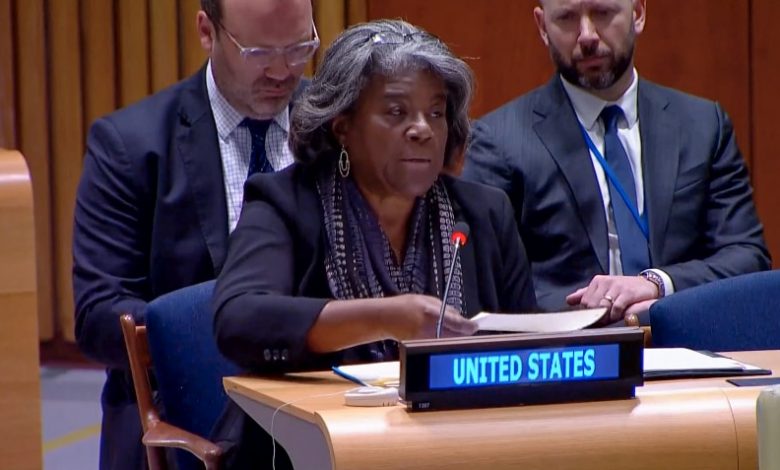Remarks by Ambassador Linda Thomas-Greenfield at an intergovernmental negotiating meeting on UN Security Council reform

Ambassador Linda Thomas-Greenfield
US Representative to the United Nations
New-York, New-York
April 3, 2023
AS DELIVERED
Thank you Mr President. And thank you to our IGN Co-Chairs, Austria and Kuwait, for your leadership on this vitally important issue. And thank you all for sharing your views today.
This month marks 78 years since world leaders convened to draft the United Nations Charter. A charter which, in Chapter V, establishes the functions, powers and composition of the UN Security Council. Council members are entrusted with the responsibility of maintaining international peace and security. And 78 years after its creation, the Security Council remains one of the most important diplomatic and multilateral fora. It’s essential, but let’s be clear, it’s far from perfect. And to meet the challenges of the 21st century, we must commit to reform.
First, the Security Council must better reflect the world and geographically diverse perspectives. That is why President Biden, in his speech during the general debate last September, called for an expansion of permanent and non-permanent membership of the UN Security Council, including permanent seats for countries from Africa and Latin America and the Caribbean.
The Security Council should reflect today’s global realities, not the global realities of nearly eight decades ago. We are open to creative ideas – and to credible, meaningful and politically viable ways. And we believe it will be important to balance the issue of size versus regional representation. There is a clear trade-off between the Council’s size and its ability to carry out its mandate efficiently.
Our commitment to growing the Council is just one of the six Principles of Responsible Conduct for Council Members that I announced last year. In setting out these principles, I made it clear that we in the Council have a special responsibility—one entrusted to us by full membership of the United Nations—to be leaders in promoting human rights and fundamental freedoms. Improving cooperation, inclusivity and transparency within the United Nations. Refrain from vetoing, except in rare and exceptional situations. to work pragmatically with all members of the Security Council, including those with whom we have bilateral disputes. And, most importantly, to defend the UN Charter – the document that guides our work and underpins peace.
This has never been so important. Because when a permanent member of the Security Council launched an illegal, unprovoked, all-out invasion of another UN member state, it struck at the heart of the UN Charter. So we must stand together and reaffirm the fundamental principles of the Charter.
Last autumn we launched a wide-ranging series of talks on Council reform – a “listening tour” that included consultations with Member States, reform groups, regional groupings and other institutional stakeholders. We are committed to soliciting input and building consensus on credible and reasonable reform proposals. And given the challenge of achieving such consensus, we must be flexible in our approach to change.
The United States supports efforts to allow member states to discuss Security Council reform in detail, including through the 2015 Framework Document and the Co-Chairs’ revised Element Paper. We continue to support efforts to inform all UN member states about the work of the Security Council – and to seek their opinions. Informal interactive dialogues and Arria formula discussions have helped ensure that all members’ voices are heard.
Colleagues, the United Nations is at a turning point as an institution. The question before us is whether we will defend an outdated status quo or reform the Security Council and strengthen the UN to meet today’s global challenges.
The United States believes deeply that we must strengthen the UN and that we must do this together. We stand ready to work fully with Member States, including through these IGN talks and the supporting “informal” talks, to make the Council more effective, representative and credible.
Thank you Mr President.
###

